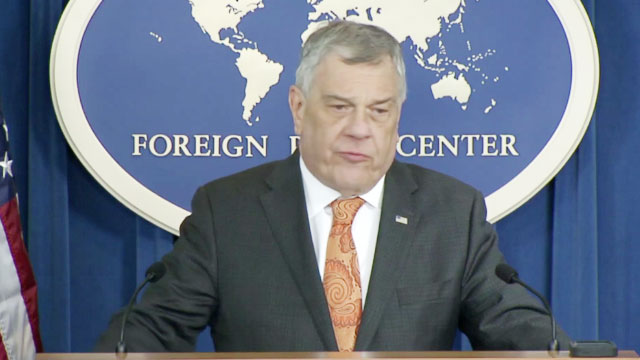State Department Correspondent
The democracy and human rights problems in Bangladesh have gotten progressively more difficult, said ambassador Michael Kozak of the State Department’s Bureau of Democracy, Human Rights, and Labor.
Ambassador Kozak came up with the comment in a press briefing organized by Foreign Press Centre of the US Department of State in reply to a question over Bangladesh issue according to US Human Rights reports
Earlier the US Secretary of State Michael R Pompeo formally released the 2018 Country Reports on Human Rights Practices and delivered on-camera remarks.
“All of these problems are documented in the report, and what I can say is that in our bilateral contacts with the authorities there, we are making all these points and saying you really need to work on this if you want to get your country back on track,” said Ambassador Kozak.
At the briefing journalist Mushfiqul asked, “In your report you mention that last election was held Bangladesh December 30th. It is not free, fair, and credible, and it was marred by the irregularities, ballot stuffing, and crackdown on opposition supporters and their candidates. And you mentioned your – in your report, main opposition leader is in jail and it is political ploy to remove her from the electoral process. So what is your recommendation to rescue a country from this darkness? And what is the U.S. position on these issues?”
In response ambassador Kozak said, “Well it’s a very good question and a difficult issue. Bangladesh is a wonderful partner and ally, an important country in the region. At the same time, the democracy and human rights problems there have gotten progressively more difficult. Again, it makes the country vulnerable to outside interference and so on when that happens.”
“I had the pleasure of engaging actually with the foreign secretary on this. We tried, for example, to get election observers in from ANFREL, the Asia election observation thing. The government wasn’t able to get visas for most of the people in time to have them be able to do their job. But our whole effort there was to say look, why don’t you get people in who know about elections? They’ll tell you what they’re seeing is going wrong, and then correct it before it happens and you won’t get into the kind of situation they’re into now,” the ambassador added.
“But it’s – all of these problems are documented in the report, and what I can say is that in our bilateral contacts with the authorities there, we are making all these points and saying you really need to work on this if you want to get your country back on track. It’s – but it’s – unfortunately, the number of those issues has multiplied, and we’re – but we’re still trying and we’re still talking, and that’s always a good sign.”
YS





